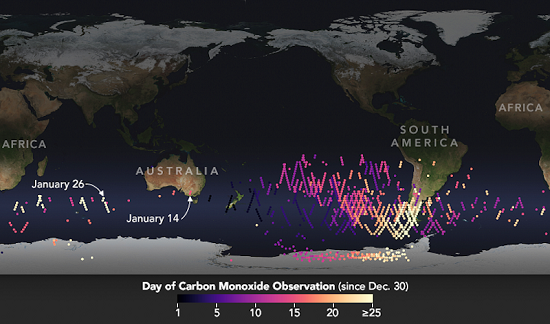2020 SkS Weekly Climate Change & Global Warming Digest #6
Posted on 9 February 2020 by John Hartz
Story of the Week... Toon of the Week... Coming Soon on SkS... Climate Feedback Claim Review... SkS Week in Review... Poster of the Week...
Story of the Week...
Australian smoke plume sets records
The recent wildfires in Australia sent one of the largest plumes of smoke higher into the stratosphere than satellites have ever before observed.

January 26, 2020. Image via NASA Earth Observatory.
Bushfires have raged in Victoria and New South Wales since November 2019, yielding startling satellite images of smoke plumes streaming from southeastern Australia on a near daily basis. The images got even more eye-popping in January 2020 when unusually hot weather and strong winds supercharged the fires.
Narrow streams of smoke widened into a thick gray and tan pall that filled the skies on January 4, 2020. Several pyrocumulus clouds rose from the smoke, and the towering clouds functioned like elevators, lifting huge quantities of gas and particles well over 6 miles (10 km) above the surface – high enough to put smoke into the stratosphere.
Australian smoke plume sets records by NASA Earth Observatory/EarthSky, Feb 6, 2020
Toon of the Week...

Coming Soon on SkS...
- What psychotherapy can do for the climate and biodiversity crises (Caroline Hickman)
- Climate goes extreme! (John Cook)
- Skeptical Science New Research for Week #6, 2020 (Doug Bostrom)
- Community choice aggregation: A brief introduction (Bruce Lieberman)
- 'What's the best kind of car for the climate?' (Sara Peach)
- 2020 SkS Weekly Climate Change & Global Warming News Roundup #7 (John Hartz)
- 2020 SkS Weekly Climate Change & Global Warming Digest #7 (John Hartz)
Climate Feedback Claim Review...
Claims of a coming 30-year “mini ice age” are not supported by science
CLAIM: "Earth about to enter 30-YEAR ‘Mini Ice Age’"
SOURCE: CHILL IN THE AIR Earth about to enter 30-YEAR ‘Mini Ice Age’ with -50C temperatures in coldest regions, scientists warn by Harry Pettit, The SUN (UK),
VERDICT: ![]()
KEY TAKEAWAY: Scientists cannot predict whether grand solar minimum, which is a decades-long period of lower solar activity, is coming. But even if one occurred, the consequences for average global temperatures would be minimal. Human-caused greenhouse gas emissions will continue to impact average temperatures much more strongly than solar activity cycles.
Claims of a coming 30-year “mini ice age” are not supported by science, Edited by Scott Johnson, Climate Feedback, Feb 6, 2020
Poster of the Week...

SkS Week in Review...
- 2020 SkS Weekly Climate Change & Global Warming News Roundup #6 by John Hartz (SkS Original)
- Earth is heating at a rate equivalent to five atomic bombs per second by Dana Nuccitelli, Yale Climate (Bulletin of the Atomic Scientists Repost)
- Skeptical Science New Research for Week #5, 2020 by Doug Bostrom (SkS Original)
- Why is the Keeling curve so curvy? by John Cook (Cranky Uncle Excerpt)
- Startups aim to pay farmers to bury carbon pollution in soil by Sarah Wessler (Yale Climate Connections Repost)
- 2020 SkS Weekly Climate Change & Global Warming Digest #5 by John Hartz (SkS Original)































 Arguments
Arguments






























Comments